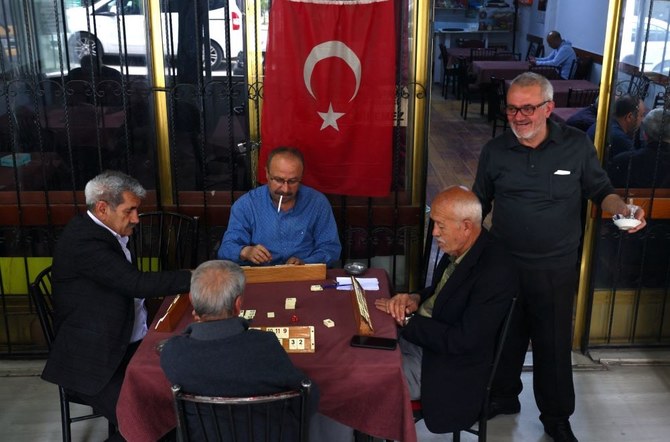ANKARA: As the Turkish presidential elections head for a runoff between incumbent Recep Tayyip Erdogan and opposition challenger Kemal Kilicdaroglu on May 28, the country’s weak economy continues to be the main focus of domestic and international attention.
Staggering inflation over the last two years, which stood at around 44 percent in April, and skyrocketing food prices have considerably increased the cost of living crisis in Turkiye.
Turkiye’s sovereign dollar bonds and equities have also plummeted, and key economic players at home and abroad are anxious and uncertain about what awaits them next.
Of total bank deposits, about 40 percent are held in foreign exchange and gold accounts, while the one-year foreign trade deficit stands at a record high of $120 billion.
Some experts say Erdogan’s economic policy agenda will be based on continuation of the status quo with unorthodox policies that use several tools to keep the economy afloat.
They also warn, though, that Turkiye’s economic situation cannot be sustained and a rethink is necessary.
A likely victory by Erdogan in the runoff vote means that his current economic policies will continue, and only partial adjustment steps such as appointing new officials to key economic positions to regain the trust of the markets are expected in case of increased financial instability.
The presence of the former economy tsar, Mehmet Simsek, on Erdogan’s electoral campaign trail sparked questions about whether Erdogan will revert to orthodox policies if he wins.
Central Bank governors in Turkiye have repeatedly been replaced over recent years as part of a strategy of not increasing interest rates.
A win for Kilicdaroglu, a former civil servant and economist, is expected to boost the economy with foreign investment flows.
For this to happen, though, the 74-year-old challenger has to widen his pool of allies in two weeks to attract more voters and re-energize his base to go to ballot box.
Timothy Ash, an economist and a strategist at BlueBay Asset Management, said the Turkish Central Bank, or CBRT, would hold the lira steady through to elections, likely below 20 lira against the dollar.
“Credit markets will be weak and vulnerable with foreign selling. After elections, I think the lira has to weaken significantly and we will see how the CBRT reacts in terms of hiking policy rates, or not,” he told Arab News.
In case Erdogan wins and continues with his existing economic policies, the demand for hard currencies is expected to increase sharply and trigger a real currency shock, which would require alternative sources of external financing.
Emre Peker, Europe director for Eurasia Group, thinks that Erdogan’s team is likely to support stability in Turkish markets in the lead-up to the runoff, where he is likely to secure re-election.
“After taking office for a third term, Erdogan is likely to stick to his current policy framework of low interest rates. Ankara may, however, unwind its years-long lira defense to allow for some currency weakness,” he told Arab News.
As Erdogan’s ruling Justice and Development Party and its People’s Alliance secured an outright majority in Sunday’s parliamentary elections, they are expected to continue with the current economic policies.
According to Peker, this is likely to stoke inflationary pressures and exacerbate economic imbalances, as Erdogan aims to instate an export-driven growth model.
“But a U-turn to a policy of orthodoxy will be unlikely unless the risk of a massive shock materializes. Parliament will have no say in economic policy, which will be controlled fully by the presidency,” he said.
Experts warn that insistence on low interest rates could push the lira further down, but on the other hand, any meaningful hike in interest rates to curb inflation would also bring recession to the economy.
Ash thinks that foreign investors will continue to reduce exposure to Turkiye until the CBRT clearly indicates how it will react on the rate front.
“It is unlikely that Erdogan will allow policy rate hikes after the election unless forced by a brutal market sell-off. He has made his views on interest rates clear in the past. He does not believe that rate hikes reduce inflation and will try to keep policy rates very low,” he added.
Enver Erkan, the chief economist at Dinamik Yatirim in Istanbul, said the expectation of two more weeks of uncertainty until the runoff may put pressure on the lira.
“The results of these policies so far have been in the form of inflation that has put more and more strain on household budgets. Controlling inflation and the exchange rate with low interest rates is very costly for the economy, and the growth is only provided by an economic support/incentive mechanism and a debt chain that creates further inflation,” he told Arab News.
According to the April budget data announced by the Ministry of Treasury and Finance, the central government budget had a deficit of 132.5 billion lira compared to 50.2 billion lira a year ago.




























